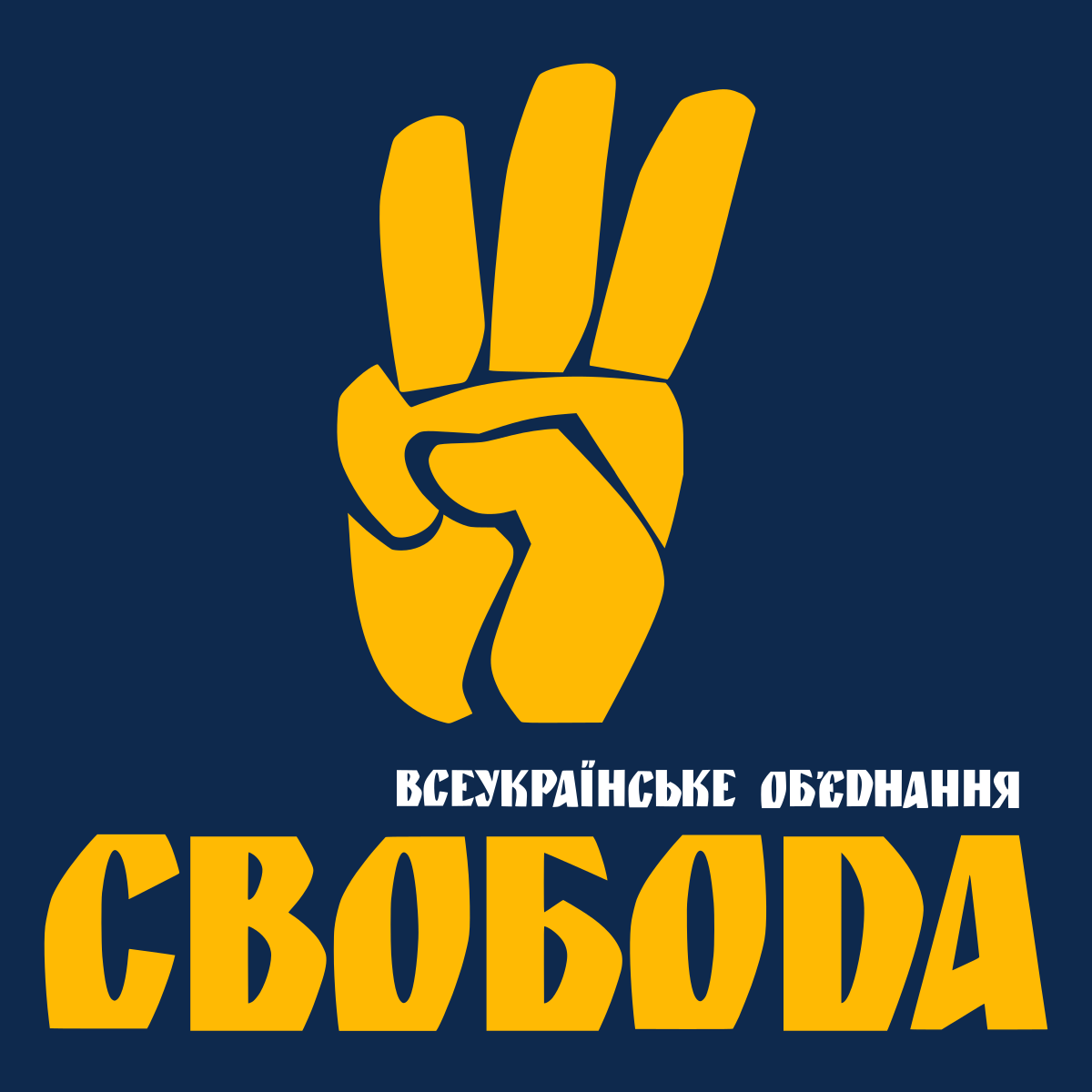https://en.wikipedia.org/wiki/Svoboda_(political_party)

The All-Ukrainian Union “Freedom” (Всеукраїнське об’єднання «Свобода»), known as the Svoboda Party for short, is a politicial party formed as the successor of the Social-National Party led by Oleh Tyahnybok.
The party formed part of the All-Ukrainian Union Maidan, had a paramilitary group, the Sich Battalion. Has a connection to a smaller group of right wing hooligans known as Unknown Patriot and the Paneuropean Conference of the Reconquista Movement (International) and a youth organisation known as Sokil was partnered with the party too.
Some members of the party split off and formed the Social-National Assembly, which later became the National Corps party.
During the Euromaidan uprising, it was a constituent of the National Resistance Headquarters, the militant street wing for the Euromaidan movement.
In the last Ukrainian general election (as of 2022), held in 2019, the party ran on a joint electoral list with National Corps, State Initiative of Yarosh (DIA), and Right Sector, and for the Presidential elections they endorsed a joint candidate alongside the Congress of Ukrainian Nationalists, Organisation of Ukrainian Nationalists Right Sector and C14, Svoboda’s Ruslan Koshulinsky. (https://www.pravda.com.ua/news/2018/11/19/7198643/)
Svoboda’s presence has been felt immediately in Ukraine’s parliament, the Verkhovna Rada, where its 37 deputies belong to a broad coalition opposing President Viktor Yanukovych’s Party of Regions.
Meeting for its first two sessions in mid-December, the Rada - as it has a number of times in the past - degenerated into scenes that resembled not so much a legislative process as an ice hockey brawl, involving dozens of shoving, punching and kicking parliamentarians.
Svoboda’s newly installed deputies, clad in traditional Ukrainian embroidered shirts, were in the thick of the melee, when not actually leading the charge.
They helped attack and drive from the opposition’s ranks two deputies - a father and son - who were accused of preparing to defect to the ruling party. Then they joined a massive free-for-all around the speaker’s rostrum, in protest at alleged illegal absentee-voting by deputies from the governing party.
One of Svoboda’s leading members, sports journalist Ihor Miroshnychenko, his ponytail flying behind him, then charged the podium to prevent a deputy speaking in Russian. (Svoboda believes that only Ukrainian should be used in all official bodies.)
Months before Miroshnychenko charged the parliament podium, Svoboda activists were photographed appearing to spray police with pepper gas, at a demonstration against a law making Russian an official language in some regions of the country.
But while the party’s radical past can be papered over, it cannot be erased. Its name until 2004 was the “Social-National Party” and it maintains informal links to another group, the Patriots of Ukraine, regarded by some as proto-fascist.
Other Svoboda members have also courted controversy. Yuriy Mykhalchyshyn, a parliamentary deputy considered one of the party’s ideologues, liberally quotes from former Nazi propaganda minister Joseph Goebbels, along with other National-Socialist leaders.
This undoubtedly appeals to a number of Svoboda’s voters, though to what extent is difficult to determine.
Even now, Svoboda’s platform calls for passports to specify the holder’s ethnicity, and for government positions to be distributed proportionally to ethnic groups, based on their representation in the population at large.
Some see signs that Svoboda’s radical elements are reasserting themselves. Activists recently attacked and sprayed tear gas at a gay rights rally in central Kiev. Ihor Miroshnychenko, meanwhile, used abusive language to describe the Ukrainian-born American actress Mila Kunis, who is Jewish, in an online discussion.
Return to 000. MOC Notables Pro-Ukrainian